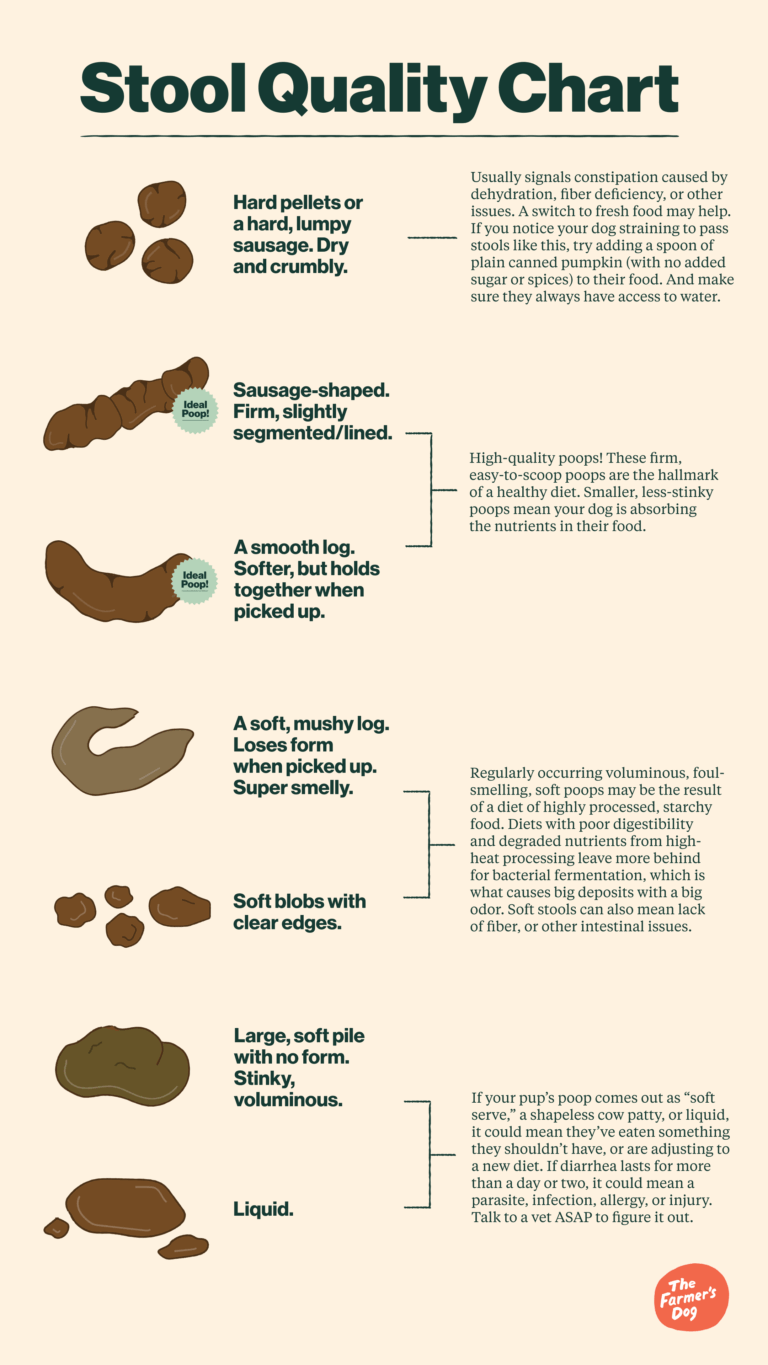What is colitis in dogs?
Colitis refers to inflammation or irritation of the colon or large intestine, and can happen in dogs just as it does in humans.
Colitis is common in dogs, and is usually treatable. While it needs to be addressed for the comfort and happiness of your pal and can sometimes indicate a serious issue, it is rarely life threatening and can often be resolved with medication or even a few simple changes to their lifestyle.
What the colon does
Your dog’s colon helps them maintain a balance of fluids and electrolytes in their body, and plays a key role in the absorption of nutrients from their food. In addition, the colon is where most of their feces is stored before they defecate.
A dog’s colon is colonized by many bacteria, which are essential to proper digestion, nutrient absorption, and proper functioning of the gastrointestinal system. This community of organisms is known as the microbiome. Beneficial bacteria in your dog’s colon help break down foods and play a key role in the absorption of nutrients.
Signs of colitis in dogs
Colitis can interfere with the breakdown of food and absorption of nutrients, often causing discomfort and diarrhea. Many dog owners report seeing frequent small bowel movements, many of which are semiliquid. This is a sure sign that your dog’s intestines are unhappy for one reason or another.
If your dog has colitis, you may notice that they have fresh red blood or mucus in their stools, or that they strain to have bowel movements. Call a vet as soon as possible if you notice any of these signs–they can lead to more serious trouble if they go untreated. Dogs with colitis may also show a lack of interest in food, lose weight, become more flatulent than usual, or seem lethargic.
The difference between acute and chronic colitis
Colitis can be acute or chronic. Acute colitis is a single event that may come on suddenly and without an obvious cause. This can sometimes clear up on its own–but it’s important to talk to your vet if you notice changes to your dog’s bowel habits, especially if you notice blood or they’re vomiting, as the cause could be something serious like a blockage in their gut or damage to their intestines from a foreign object. In cases like that, a short delay could make a big difference for a dog’s prognosis.
Chronic colitis is persistent inflammation of your dog’s colon or large intestine, and can be present for weeks or months–sometimes going away and returning. If your dog seems out of sorts or not their normal happy self, it’s a good idea to take them to the vet for a checkup.
Diagnosing colitis
Colitis can have a wide variety of root causes, so your veterinarian will likely ask a lot of questions about your dog in order to get a better idea of what’s causing issues for them. They’ll inquire about signs you’ve noticed, travel history, exposure to other dogs, if your dog might have eaten something they shouldn’t have, and if you’ve recently changed the brand or type of food you feed them. Any dog can suffer from colitis, but it’s most common during middle age.
If a vet suspects that your dog has colitis, they will investigate to find the reasons behind it. This could involve blood tests for kidney, liver, and pancreatic function, plus electrolyte levels; X-rays of their abdomen to check for foreign objects or obstructions; or an ultrasound to look inside their digestive tract. They may also test your dog’s feces for disease-causing bacteria or parasites.
Depending on how severe your dog’s condition is, the vet may want to keep them overnight for observation or give them intravenous fluids to keep them hydrated.
Causes of colitis in dogs, and how to treat them
Stress
Excessive stress can tax your dog’s body and make them more susceptible to many conditions, including colitis. Watch your pup for signs that they might be upset, including changes in behavior and body language, barking and other signals that they’re anxious or otherwise not feeling their best. Changes to their routine (like a person who used to be around all the time suddenly leaving more often, which can lead to bouts of separation anxiety) and traumatic events are among the factors that can cause dogs to feel stressed. It’s always good to do what you can to reduce stress in your dog’s life, and it’s even more important to do so if that stress is impacting their physical health.
Intestinal parasites or worms
Your dog can contract a parasite by eating feces, animals, or fleas; playing with infected dogs; or drinking water that’s infested with it. Parasites can cause dogs all sorts of problems, including colitis. If your dog does have a parasite, you may notice live or dead worms in their feces.
Parasites are usually most dangerous in puppies or dogs with other underlying health issues, but they always need to be addressed and can be a hazard to any pup if left untreated. Bring your dog to the vet as soon as possible for a diagnosis, and, if necessary, medication.
Infections
Your dog’s gastrointestinal tract can become infected with pathogenic (disease-causing) bacteria that can make them feel ill. They can pick up infections from food, feces, dead animals, or contaminated water they find while out on a walk or playing in the park, or from undercooked meat or unsanitary bowls at home.
Dogs are more prone to bacterial infections if their immune system is weakened from other illnesses, lack of exercise, too much stress, or a poor diet. If your dog eats something they shouldn’t, monitor them closely and give the vet a call. If symptoms develop, get them medical attention right away.
Bacterial infections are treated with a course of antibiotics. Be sure to give your dog the entire course of medication that your vet prescribed, even they seem to have recovered. Otherwise, the infection may reoccur–this time with bacteria that are more resistant to the type of antibiotic you previously used.
Generally speaking, a sufficient amount of fiber in a dog’s diet may help with colitis. This is one of many reasons you should feed your dog a high-quality, complete and balanced food that meets all of their nutritional needs. Fresh, whole food in particular may help your dog maintain good bowel habits—fresh food is highly digestible and contributes to high quality poops.
If necessary and in consultation with a veterinarian, you may try adding a fiber supplement like canned pumpkin or psyllium husk to your dog’s diet.
Ingestion of foreign material
Non-food items with rough or sharp edges, or with chemicals in them, can upset the sensitive lining of your dog’s intestines. Small cuts in their gut from sharp objects can cause bleeding and may increase their risk of infection. There’s also the risk of a bowel obstruction, which is a medical emergency. If your dog has eaten something they shouldn’t have, contact a veterinarian and watch them closely. If they show any signs of illness, get them to the vet right away. Depending on what your dog ate and how they’re feeling, the vet might suggest a variety of approaches ranging from waiting for the object to pass on its own to emergency surgery.
Food allergies
Allergies and food sensitivities can cause a range of symptoms in dogs, including itchy or dry skin and digestive disturbances like vomiting or diarrhea. Other symptoms include hyperactivity, weight loss, lack of energy–and colitis.
If the vet suspects allergies to be the cause of your dog’s colitis, you will have to change your dog’s diet. It may take time to determine what is causing the intolerance, though vets can use skin or blood tests to check for certain allergies. They may also recommend an elimination diet to try to determine what food is causing the problem. Food allergies don’t generally respond well to anti-allergy medication, but there are some cases in which they may be useful. With knowledge of your dog’s particular situation, your vet will be able to discuss their treatment options.
How to avoid colitis in dogs
Colitis has many possible causes, and it’s impossible to eliminate all risk from your dog’s life–but there are things you can do to reduce the odds of their suffering from this condition. Your best bet is to train your dog to not eat anything they find out on walks, avoid feeding them foods known to be harmful to dogs, and give them plenty of fresh water and exercise.
A hydrated, fit dog who eats a healthy, complete and balanced diet is more likely to have a healthy immune system, enabling them to fight off infections and parasites. It’s also a good idea to give your pet the most comfortable, stress-free environment you can. This means treating them kindly, giving them lots of quality time with humans and animals they love, serving them healthy food, and providing comfortable places to sleep and play.
If you’re concerned about your dog and suspect colitis may be the issue, make an appointment to see your vet as soon as you can.

This article was vetted by a vet.
Reviewed by Alex Schechter, DVM, founding veterinarian at Burrwood Veterinary.









